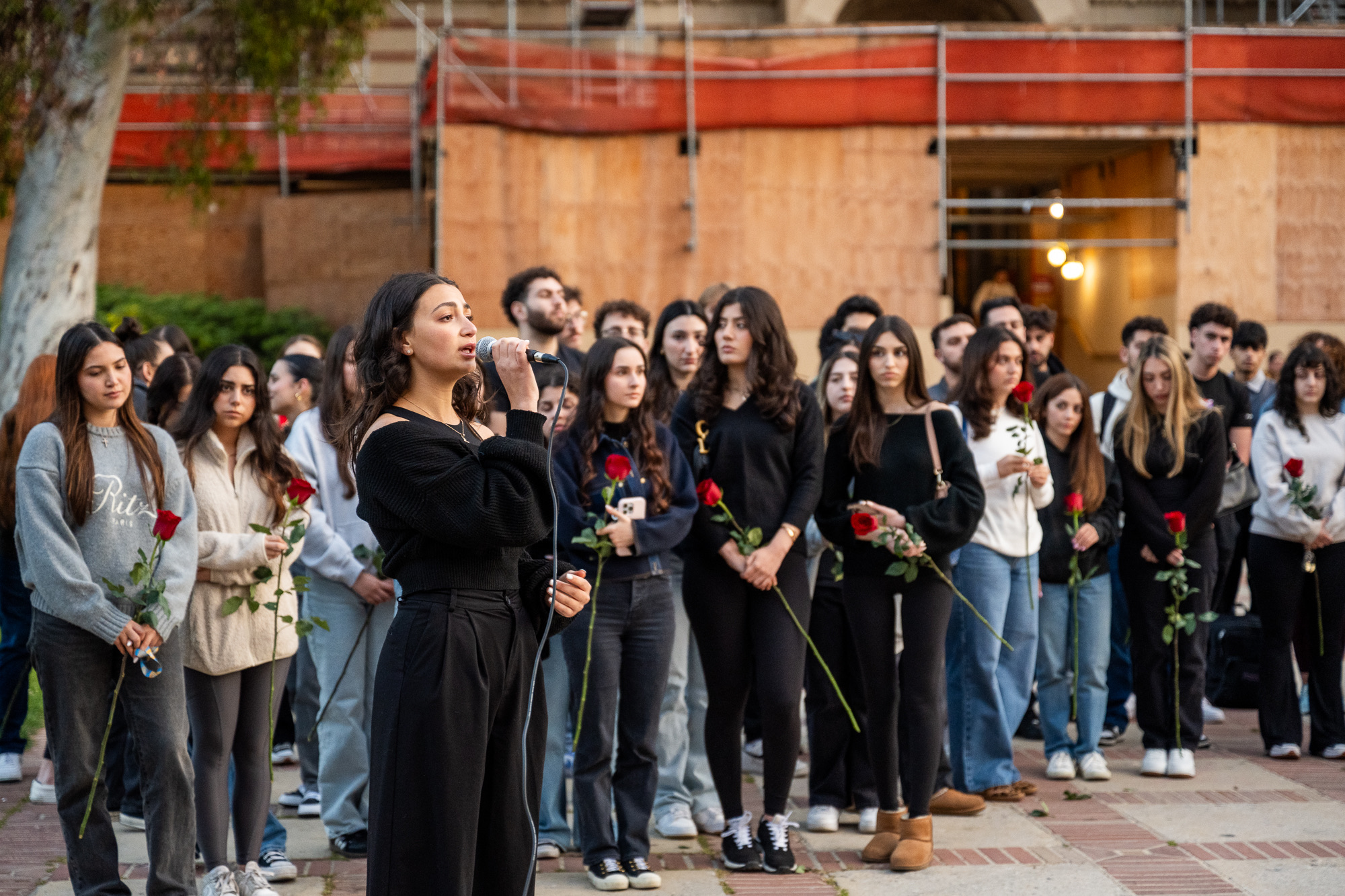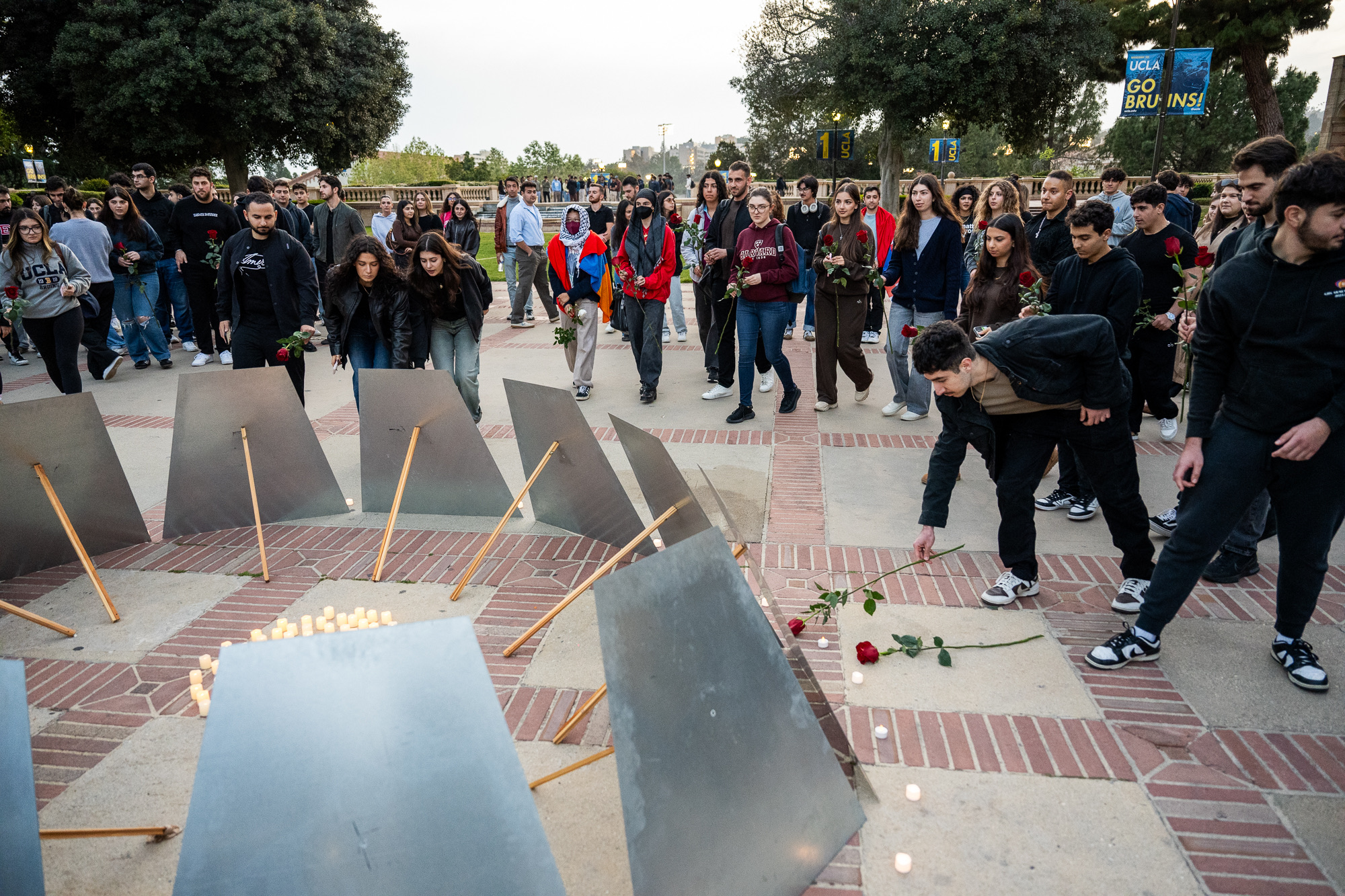Armenian Students’ Association hosts vigil for 110th Armenian genocide anniversary
A crowd listens to a speaker at the Armenian Students’ Association candlelight vigil. The annual event commemorated the 110th anniversary of the Armenian Genocide and was hosted in collaboration with the University of Southern California’s Armenian Student Association. (Courtesy of Yervand Matevosian)
By Victor Simoes
May 12, 2025 1:09 a.m.
The Armenian Students’ Association hosted their annual candlelight vigil in Dickson Plaza on April 24 to commemorate the Armenian Genocide.
The vigil – which over 100 students and community members attended – honored the lives lost during the Armenian Genocide, said Alexander Azilazian, the political affairs chair of ASA and a fourth-year political science student. From 1914 to 1922, around one million Armenians were killed by the Ottoman Empire, according to the United States Holocaust Memorial Museum.

UCLA students hosted the event in collaboration with the University of Southern California’s Armenian Student Association. The two student associations collected donations for the Armenian Medpack Project – which supplies medical equipment to frontline personnel impacted by Azerbaijani aggression – in exchange for roses, which they then placed on a replica of the Tsitsernakaberd Memorial complex.
“I think it’s really beautiful how we’re able to put our differences aside for one common cause,” said Eric Abnoosian, a USC alumnus who attended the event. “We gather here, not as Trojans or Bruins, but as humans, as Armenians, to remember this horrific part of our history, and to remember and acknowledge and demand justice.”
The vigil opened with a speech from Maral Tavitian, managing director of the USC Institute of Armenian Studies, who spoke about reorienting the discussion of Armenian identity to center Armenians’ contemporary experiences.
“To speak as an Armenian also means to speak as a member of an ancient people who are very much alive today, to remind ourselves that as Armenians, we are not only relics of the past but active contributors to the present,” Tavitian said in the speech.
Tavitian was followed by Father Avedis Abovian, an Armenian priest, who said Armenians should look beyond the genocide as the defining element of their history and then guided the audience in a recitation of the “Hayr Mer” – the Lord’s Prayer in Armenian.
The organizers also welcomed poet Karén Karslyan, who spoke about the difficulty of dealing with the grief and trauma of the genocide and remembering lost generations. He then introduced his poem by a poet who was never born, which consisted of a moment of silence.
Then, ASA Treasurer Aryana Sargsyan, a third-year molecular, cell and developmental biology student, gave a musical performance of “Kyanq U Kriv,” an eponymous Armenian song with lyrics about fighting for one’s country.
“We survived, we’re here, we’re going to continue to flourish, we’re going to continue to thrive, and as long as we have you guys, our youth, showing up to these kinds of things, Armenia is never going to die,” said Lilia Hovsepyan, a fourth-year philosophy student and ASA’s internal vice president.
The candlelight vigil was a part of ASA’s programming for Armenian History Month, which also included mante making and “Coachellian,” a cultural showcase of Armenian music and dance.

Armenians at UCLA have established chapters in other organizations such as the Hidden Road Initiative, which connects students in remote Armenian communities to leadership experience, and the Freedom Loving Youth, which supports single mothers and children in Armenia, according to a written statement from ASA Philanthropy Chair Lucine Ksajikian, a third-year psychobiology student.
Armenian Genocide Remembrance Day holds special meaning to many members who descend from survivors of the genocide, including Ksajikian and Azilazian.
“Us being able to be here today as the Armenian Students’ Association is proof that those martyrs did not die in vain,” Azilazian said.
During the vigil’s set up and again as the event progressed, the event organizers were approached by security personnel and by an administrator with Student Organizations Leadership and Engagement seeking a permit for the event.
ASA President Miqo Hovasyan said in a written statement that the group has never needed a permit to host in the nearly 80-year history of the commemoration. However, the event continued with some changes, including avoiding the use of sound amplification, he added in the statement.
“Although we had to make some adjustments, such as foregoing the use of a microphone or speaker system, we were still able to proceed with the commemoration,” said Hovasyan, a third-year molecular, cell and developmental biology student, in the statement. “However, it remains concerning that such sudden restrictions and questions arose for a long-standing peaceful tradition.”
The event violated UCLA’s Time, Place and Manner policies due to the use of amplified sound, physical structures and being located outside areas designated for free expression without a necessary permit, a UCLA spokesperson said in a written statement.
“When Student Affairs approached and advised the group of these violations, they complied and concluded their expression,” the spokesperson said in the statement. “The group acknowledged the oversight, expressed regret, and noted their longstanding history of compliance and collaboration with their SOLE advisor.”
UCPD did not respond to request for comment regarding security personnel approaching the organizers.
Despite the interruption, Hovasyan said it was important to come together as a community to remember the tragedy.
“If there’s one truth I hope every single person learns and carries with them today, it’s this: We are unbreakable when we stand together,” Hovasyan said in a speech. “Every step we take, every word we speak in our mother tongue, every tradition we uphold is an act of defiance, of survival and of honor to those who came before us. And as long as we continue to walk together, no one, no power can erase us.”
